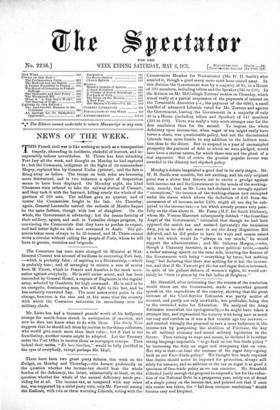Mr. Stansfeld, after intimating that the success of the resolution
would throw out the Government, made a somewhat general speech on the expenditure of the country, showing that the great increase of the Civil-Service Estimates was partly matter of account, and partly not only inevitable, but profitable, being due to the extended votes for Education. He analyzed the Army Estimates somewhat too apologetically,—he might have taken a stronger line, and reproached the country with being now as much too easy and careless as it was a few months ago too nervous,— and resisted strongly the proposal to save a mere halfpenny in the income-tax by postponing the abolition of Purchase, the key to all military economy and sound military legislation in the future. Then turning to ways and means, he declared it in rather strong language impossible "to go back on our free-trade policy" by increasing the duty on sugar and reimposing that on corn. But why is that—at least the increase of the sugar duty—going back on our Free-Trade policy? We thought free trade required that duties should never be imposed for protection, always add solely for revenue, and an addition to the tax on sugar is as good a specimen of free-trade policy as we can conceive. Mr. Stansfeld ridiculed justly enough the proposal to suspend a law for the reduc- tion of the National Debt in a prosperous year, solely out of dread of a single penny on the income-tax, and pointed out that if once this coarse was taken, the "fall from virtuous resolutions" would become easy and frequent. -
































